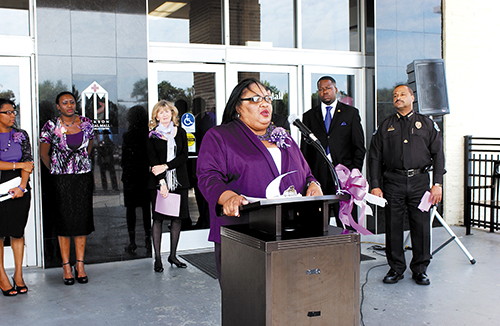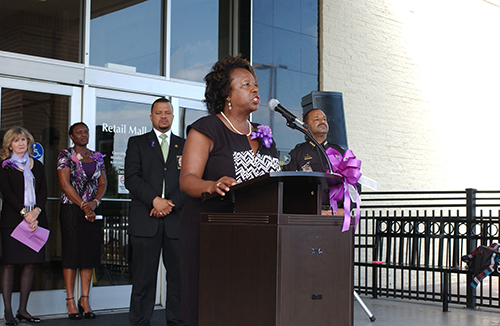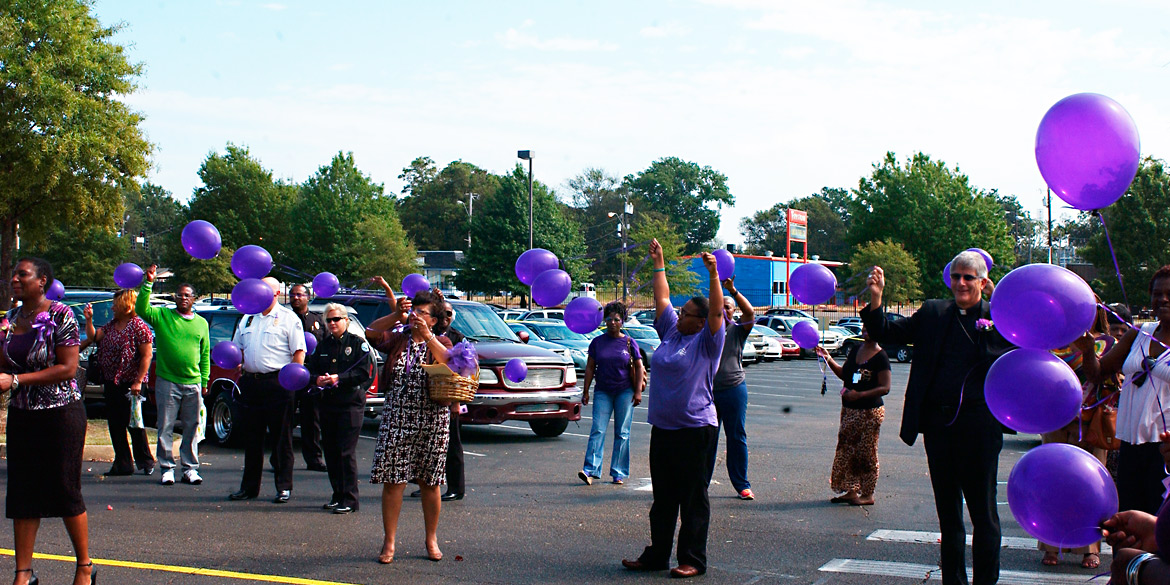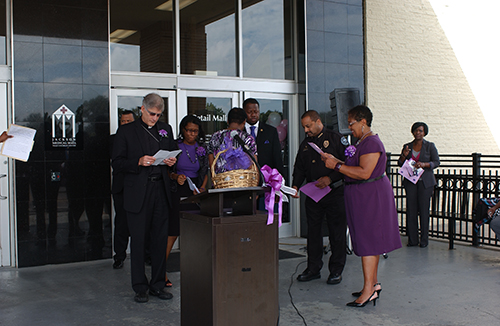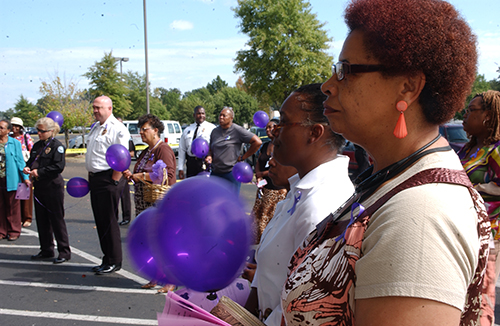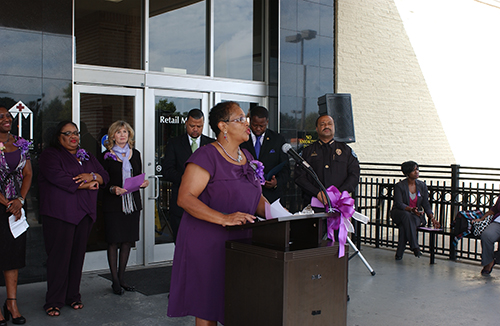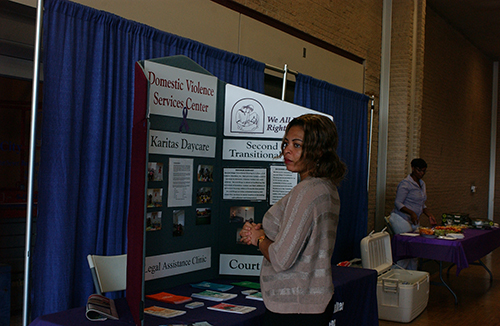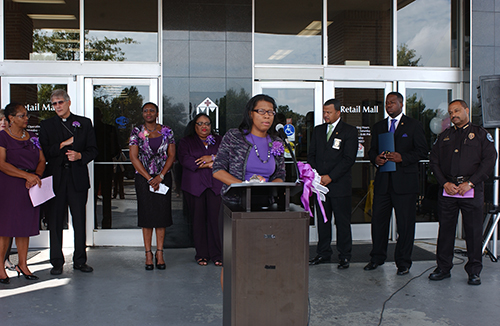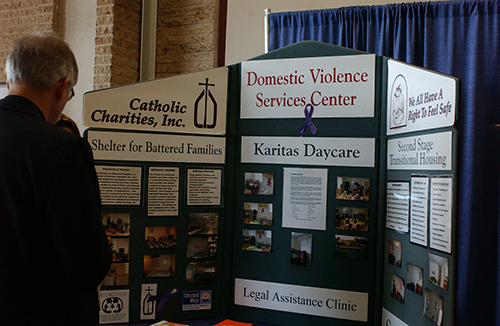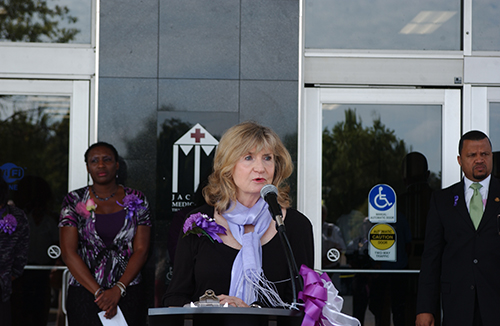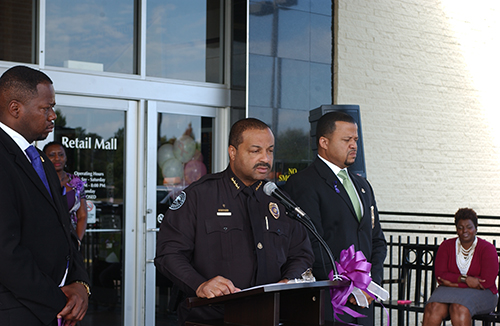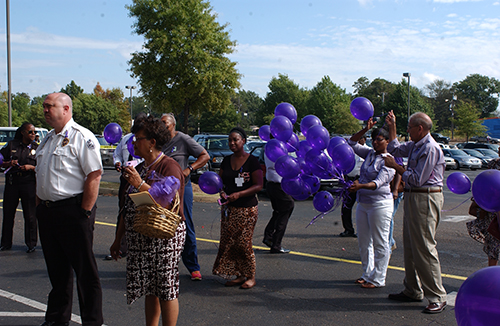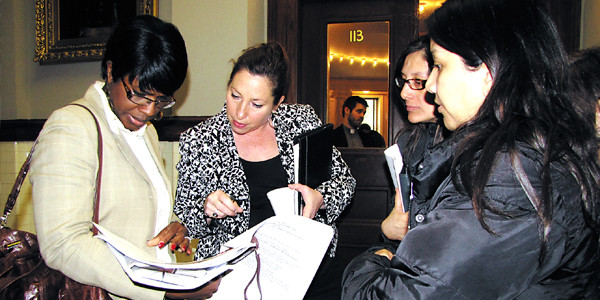By Maureen Smith
JACKSON – Catholic Charities Jackson is looking for a new home for its domestic violence shelter. Advocates announced the need during a rally at the Jackson Medical Mall Wednesday, Oct. 1, to mark the start of Domestic Violence Awareness Month.
Bishop Joseph Kopacz led the gathering in prayer. The keynote speaker, Shirley Smith, a survivor-turned-advocate, endured violence at the hands of her husband for 25 years. She has since written a book and helps others see their way out of abusive situations. Smith spoke about the potential to help more women with a new shelter. “When I drive around Jackson, I see empty apartment complexes and abandoned homes. When I see that I visualize serenity homes,” she said.
Other advocates, including the City of Jackson’s new police chief, spoke at the rally about the important role Catholic Charities has played in turning victims into survivors. At the end of the rally, attendees released purple balloons to symbolize freedom from violence.
The current Shelter for Battered Women has eight bedrooms, each of which has two beds and a crib so a woman can bring her baby or children with her. It houses a daycare and has a kitchen where the staff prepares meals. What it lacks, said Gwen Bouie-Haynes, division director for adult services for Catholic Charities, is offices, meeting and counseling spaces.
The operation has been in its current location for 29 years. Bouie-Haynes said they have outgrown the space, plus it is in need of a great number of repairs.
Arteria Puckett is the program manager. She said the shelter is much more than just a place to stay. “We ask that each person, after they get settled, start to look for employment and housing,” she said. “We do case management and assessment for them and we meet two-to-three times a week to check on their progress,” she added. Clients can take advantage of on-site counseling, parenting classes and support group meetings. The daycare helps mothers seek employment. Clients can eat three meals and one snack a day at the shelter and get referrals for necessities such as clothing and groceries.
Puckett said the shelter has very limited storage space so while she can keep a few toiletries she cannot even keep donated clothes on-site. Many women and children have to leave their situation with literally the clothes on their backs and nothing else. Puckett has to send them to another agency to get clothes.
Clients are allowed to stay for 30 days initially. Near the end of that time, a case worker will see where they are in the job and housing search and come up with a longer-term plan for living independently. Even after a family leaves, shelter employees make follow-up appointments to make sure families have access to the resources they need to continue to live free of violence.
Puckett told the story of one woman who was able to go from having no transportation, childcare, job or apartment to being independent in just a little more than a month. A case worker was able to work with a landlord on the deposit and with dedication and a good attitude, the client hopes to continue to turn her life around. The client still uses the daycare and has hope of continuing to turn her life around.
Bouie-Haynes said she would like to expand the program’s services with a new facility. “We would like to partner more with stakeholders, such as law enforcement, have round table discussions, things like that,” she said. The lack of meeting space makes these partnerships and other potential program offerings difficult.
An ideal new shelter would include at least 12 rooms for families as well as rooms for a house manager and overnight weekend staff, a commercial kitchen, daycare facilities including a playground area for children, storage and office space for staff, meeting and conference rooms. It has to be on a bus line, close to employment and retail opportunities and, of course, be a secure facility.
“If we had a facility to offer those components, we really could reach significantly more people in our nine-county service area,” said Bouie-Haynes. They currently serve 250 people a year, 150 of whom are children. The program has some money that could be used for renovating an existing facility and her dream would be that someone would donate a property.
In the meantime, a search and fund raising continues. The shelter can always use volunteers. Bouie-Haynes said they need a nurse to help with intake screenings. People are also welcome to come host birthday or holiday parties for the children who are staying in the shelter.
The daycare can also use volunteers to read to the children. Potential volunteers will have to go through a background check and child protection training. Contact Catholic Charities at 601-355-8634 to volunteer.

